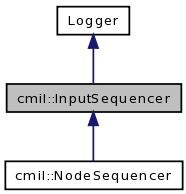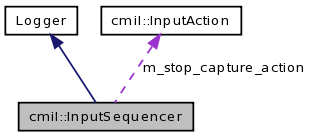
#include <InputSequencer.h>
Inheritance diagram for cmil::InputSequencer:


Public Types | |
| Trigger | |
| Capture | |
| enum | Mode { Trigger, Capture } |
Public Member Functions | |
| InputSequencer () | |
| virtual | ~InputSequencer () |
| void | captureNormal (ModAction *stop_action) |
| Ev::Sequence * | getCaptured () const |
| bool | handle (const InputData &input) |
| bool | handle (const ModData &input) |
| virtual bool | isCombo (const Ev::Sequence &seq) const =0 |
| This function should provide validation of combo style sequences for clients. | |
| virtual bool | isNormal (const Ev::Sequence &seq) const =0 |
| This function should provide validation of regular sequences for clients. | |
| virtual std::string | getName () const |
| bool | addNormal (const Ev &event) |
| bool | removeNormal (const Ev &event) |
| bool | addCombo (const Ev &event) |
Protected Attributes | |
| Mode | m_mode |
| InputAction * | m_stop_capture_action |
| Ev::Sequence * | m_captured |
Private Member Functions | |
| virtual Ev::Sequence * | capture (const ModData &input)=0 |
| This should return a non-null once a valid sequence is passed. | |
| virtual bool | imp_handle (const ModData &input)=0 |
| virtual bool | imp_handle (const InputData &input)=0 |
| virtual bool | imp_addNormal (const Ev::Sequence &seq)=0 |
| virtual bool | imp_removeNormal (const Ev::Sequence &seq)=0 |
| virtual bool | imp_addCombo (const Ev::Sequence &seq)=0 |
Definition at line 28 of file InputSequencer.h.
Definition at line 32 of file InputSequencer.h.
| cmil::InputSequencer::InputSequencer | ( | ) | [inline] |
Definition at line 30 of file InputSequencer.h.
00030 : m_mode(Trigger), m_stop_capture_action(NULL), m_captured(NULL) {}
| virtual cmil::InputSequencer::~InputSequencer | ( | ) | [inline, virtual] |
Definition at line 43 of file InputSequencer.h.
References m_captured.
00043 { 00044 if(m_captured) 00045 delete m_captured; 00046 };
| bool cmil::InputSequencer::addCombo | ( | const Ev & | event | ) | [inline] |
Definition at line 117 of file InputSequencer.h.
References cmil::Ev::getSequence(), imp_addCombo(), isCombo(), and Logger::log_debug().
Referenced by cmil::defaultContext::addCombo().
00117 { 00118 Ev::Sequence* sequence; 00119 if((sequence = event.getSequence()) != NULL) { 00120 log_debug("addCombo validating.."); 00121 if(isCombo(*sequence)) { 00122 return imp_addCombo(*sequence); 00123 } 00124 } 00125 return false; 00126 }
Here is the call graph for this function:

Here is the caller graph for this function:

| bool cmil::InputSequencer::addNormal | ( | const Ev & | event | ) | [inline] |
Definition at line 95 of file InputSequencer.h.
References cmil::Ev::getSequence(), imp_addNormal(), isNormal(), and Logger::log_debug().
Referenced by cmil::defaultContext::addNormal().
00095 { 00096 Ev::Sequence* sequence; 00097 if((sequence = event.getSequence()) != NULL) { 00098 log_debug("addNormal validating.."); 00099 if(isNormal(*sequence)) { 00100 return imp_addNormal(*sequence); 00101 } 00102 } 00103 return false; 00104 }
Here is the call graph for this function:

Here is the caller graph for this function:

| virtual Ev::Sequence* cmil::InputSequencer::capture | ( | const ModData & | input | ) | [private, pure virtual] |
This should return a non-null once a valid sequence is passed.
Implemented in cmil::NodeSequencer.
Referenced by handle().
Here is the caller graph for this function:

| void cmil::InputSequencer::captureNormal | ( | ModAction * | stop_action | ) | [inline] |
This should cause the sequencer to start capturing sequences, when it receives a valid sequence, it should stop and run the associated stop_seq action, this is similar to a "callback". The user can then check which sequence was captured using getCaptured().
Remove any prior captured sequence, this is necessary inorder for handle(ModData) to work properly
Definition at line 52 of file InputSequencer.h.
References Capture, Logger::log_error(), m_captured, m_mode, and m_stop_capture_action.
Referenced by cmil::defaultContext::captureNormal().
00052 { 00053 if(m_mode == Capture) 00054 log_error("captureSeq() already in capture mode."); 00055 else { 00056 m_stop_capture_action = stop_action; 00057 m_mode = Capture; 00058 00060 if(m_captured) { 00061 delete m_captured; 00062 m_captured = NULL; 00063 } 00064 } 00065 }
Here is the call graph for this function:

Here is the caller graph for this function:

| Ev::Sequence* cmil::InputSequencer::getCaptured | ( | ) | const [inline] |
Definition at line 67 of file InputSequencer.h.
References m_captured.
Referenced by cmil::defaultContext::getCaptured().
00067 { 00068 return m_captured; 00069 };
Here is the caller graph for this function:

| virtual std::string cmil::InputSequencer::getName | ( | ) | const [inline, virtual] |
Implements Logger.
Reimplemented in cmil::NodeSequencer.
Definition at line 93 of file InputSequencer.h.
| bool cmil::InputSequencer::handle | ( | const ModData & | input | ) | [inline] |
This concretely enforces capture behavior, InputData is ignored because there is no way of determining the kind of sequence desired by the user based on it.
Definition at line 78 of file InputSequencer.h.
References capture(), Capture, imp_handle(), m_mode, and Trigger.
00078 { 00079 if(m_mode == Capture) { 00080 if(capture(input)) 00081 m_mode = Trigger; 00082 } 00083 00084 return imp_handle(input); 00085 };
Here is the call graph for this function:

| bool cmil::InputSequencer::handle | ( | const InputData & | input | ) | [inline] |
Definition at line 71 of file InputSequencer.h.
References imp_handle().
Referenced by cmil::defaultContext::update().
00071 { 00072 return imp_handle(input); 00073 };
Here is the call graph for this function:

Here is the caller graph for this function:

| virtual bool cmil::InputSequencer::imp_addCombo | ( | const Ev::Sequence & | seq | ) | [private, pure virtual] |
Implemented in cmil::NodeSequencer.
Referenced by addCombo().
Here is the caller graph for this function:

| virtual bool cmil::InputSequencer::imp_addNormal | ( | const Ev::Sequence & | seq | ) | [private, pure virtual] |
Implemented in cmil::NodeSequencer.
Referenced by addNormal().
Here is the caller graph for this function:

| virtual bool cmil::InputSequencer::imp_handle | ( | const InputData & | input | ) | [private, pure virtual] |
Implemented in cmil::NodeSequencer.
| virtual bool cmil::InputSequencer::imp_handle | ( | const ModData & | input | ) | [private, pure virtual] |
Implemented in cmil::NodeSequencer.
Referenced by handle().
Here is the caller graph for this function:

| virtual bool cmil::InputSequencer::imp_removeNormal | ( | const Ev::Sequence & | seq | ) | [private, pure virtual] |
Implemented in cmil::NodeSequencer.
Referenced by removeNormal().
Here is the caller graph for this function:

| virtual bool cmil::InputSequencer::isCombo | ( | const Ev::Sequence & | seq | ) | const [pure virtual] |
This function should provide validation of combo style sequences for clients.
Implemented in cmil::NodeSequencer.
Referenced by addCombo().
Here is the caller graph for this function:

| virtual bool cmil::InputSequencer::isNormal | ( | const Ev::Sequence & | seq | ) | const [pure virtual] |
This function should provide validation of regular sequences for clients.
Implemented in cmil::NodeSequencer.
Referenced by addNormal(), and removeNormal().
Here is the caller graph for this function:

| bool cmil::InputSequencer::removeNormal | ( | const Ev & | event | ) | [inline] |
Definition at line 106 of file InputSequencer.h.
References cmil::Ev::getSequence(), imp_removeNormal(), isNormal(), and Logger::log_debug().
Referenced by cmil::defaultContext::removeNormal().
00106 { 00107 Ev::Sequence* sequence; 00108 if((sequence = event.getSequence()) != NULL) { 00109 log_debug("removeNormal validating.."); 00110 if(isNormal(*sequence)) { 00111 return imp_removeNormal(*sequence); 00112 } 00113 } 00114 return false; 00115 }
Here is the call graph for this function:

Here is the caller graph for this function:

Ev::Sequence* cmil::InputSequencer::m_captured [protected] |
Definition at line 130 of file InputSequencer.h.
Referenced by cmil::NodeSequencer::capture(), captureNormal(), getCaptured(), and ~InputSequencer().
Mode cmil::InputSequencer::m_mode [protected] |
InputAction* cmil::InputSequencer::m_stop_capture_action [protected] |
Definition at line 129 of file InputSequencer.h.
Referenced by cmil::NodeSequencer::capture(), and captureNormal().
 1.4.7
1.4.7